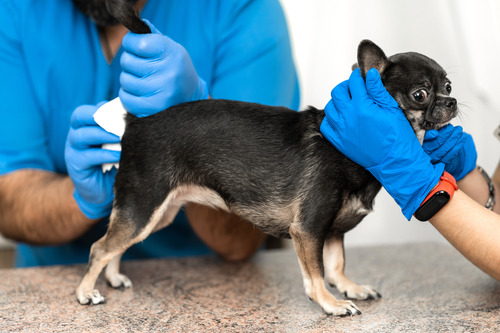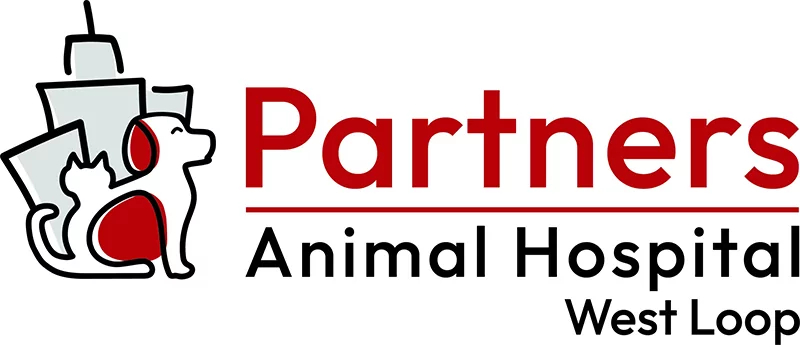Anal Gland Issues in Dogs: What to Be Aware of

Have you ever noticed your dog scooting across the floor or excessively licking their rear? These behaviors may seem harmless at first, but they could be signs of a common yet often overlooked issue: anal gland problems. For many pet owners, this topic might feel a bit uncomfortable to discuss, but understanding these issues is crucial for your dog’s comfort and health. At Partners Animal Hospital West Loop, we’re here to help. If you’re concerned about your dog’s anal glands, call us at (312) 767-4762 or book an appointment online today. These tiny but important glands can cause significant problems if they become impacted or infected.
What Are Anal Glands, and Why Are They Important?
Anal glands, or anal sacs, are small glands located on either side of a dog’s rectum. These sacs naturally secrete a fluid with a unique scent that dogs use for marking territory and communication. While small dogs may have less noticeable anal gland issues, large breeds are equally prone to problems.
In healthy dogs, the glands empty themselves during bowel movements. However, when the glands fail to empty properly, the fluid inside can build up, leading to discomfort, irritation, and, in severe cases, infection or abscesses. Recognizing the importance of anal glands is the first step to addressing potential problems early.
Signs Your Dog May Have Anal Gland Issues
Dogs often display specific behaviors or symptoms when they are experiencing anal gland problems. Paying attention to these signs can help you identify and address issues promptly:
- Scooting: One of the most noticeable signs is your dog dragging its bottom across the floor. This behavior often indicates irritation or discomfort.
- Licking or Chewing: Excessive licking or biting at the anal area may signal that your dog is trying to relieve discomfort.
- Swelling or Redness: Visible swelling or redness around the anus could indicate an impacted or infected gland.
- Foul Odor: Anal gland fluid has a strong, fishy smell that may become noticeable if the glands are not emptying properly.
- Difficulty Defecating: Straining or discomfort during bowel movements may be a sign of anal gland blockage.
- General Irritability: Dogs with anal gland issues may seem more restless or irritable than usual.
If you notice any of these signs, it’s essential to seek professional care. Call Partners Animal Hospital West Loop at (312) 767-4762 to schedule an appointment for an evaluation.
Common Causes of Anal Gland Problems in Dogs
Several factors can contribute to anal gland issues in dogs. Understanding these causes can help you take steps to prevent problems:
- Diet: Low-fiber diets can result in softer stools, which may not put enough pressure on the glands to empty them naturally.
- Obesity: Overweight dogs are more prone to anal gland problems, as excess fat can interfere with normal gland function.
- Breed Predisposition: Some breeds, such as Bulldogs, Beagles, and Poodles, are more susceptible to anal gland issues due to their anatomy.
- Chronic Diarrhea: Frequent loose stools or diarrhea can prevent the glands from emptying properly.
- Allergies: Food or environmental allergies can cause inflammation, leading to anal gland problems.
- Infections: Bacteria can enter the glands and cause infections, leading to abscesses or even ruptures if left untreated.
How Are Anal Gland Issues in Dogs Treated?
Addressing anal gland problems typically requires professional veterinary care. Here are some common treatments your veterinarian may recommend:
Expressing the Glands
The most common solution for impacted glands is manual expression. Your veterinarian will carefully empty the fluid from the glands, relieving your dog’s discomfort. While some groomers offer this service, it is best performed by a veterinarian to avoid potential complications.
Dietary Adjustments
Adding more fiber to your dog’s diet can improve stool consistency, helping the glands empty naturally during bowel movements. Your vet may recommend specific high-fiber foods or supplements.
Antibiotics or Anti-Inflammatory Medications
If an infection is present, your dog may need antibiotics to clear it up. Anti-inflammatory medications can also help reduce swelling and discomfort.
Surgery
In severe or recurring cases, surgical removal of the anal glands may be recommended. This is generally considered a last resort and is only performed when other treatments have failed.
Home Monitoring
While professional care is essential, monitoring your dog at home for recurring signs can help you act quickly if problems arise. Always consult your veterinarian before attempting any home remedies.
How to Prevent Anal Gland Issues
Preventive care can significantly reduce the likelihood of anal gland problems. Here are some tips to keep your dog’s anal glands healthy:
- Provide a diet rich in fiber to promote firm stools, aiding natural gland expression.
- Maintain a healthy weight through regular exercise and a balanced diet to help prevent obesity, reducing the risk of anal gland issues.
- Routine check-ups allow your veterinarian to monitor your dog’s anal gland health and address any concerns early.
- Identifying and managing food or environmental allergies can reduce inflammation that might lead to gland problems.
- Keep an eye on your dog for any signs of discomfort, such as scooting or excessive licking, and seek veterinary care promptly.
Ignoring anal gland issues in dogs can lead to severe complications, including infections, abscesses, or ruptures. Early intervention not only relieves your dog’s discomfort but also prevents more serious health problems down the line. By recognizing the signs and seeking prompt veterinary care, you can ensure your dog’s well-being and quality of life. At Partners Animal Hospital West Loop, we are dedicated to providing compassionate and professional care for your pet. If you suspect your dog is experiencing anal gland issues, don’t wait. Call us at (312) 767-4762 or book an appointment online today to give your dog the relief they deserve.
About Us
At Partners Veterinary Group, we believe in energizing our team members through shared values, while helping them create value for our clients and patients. Knowing we can help make pets’ and people’s lives better motivates us to continually strive for excellence and love what we do.
Our team consistently works to build educational, supportive, and cooperative work environments that cater to positive experiences and professional growth. We’re constantly evolving, creating innovative ways to deliver cutting-edge medicine to our patients. We equip our teams with tools to enhance their skills and improve their knowledge.
